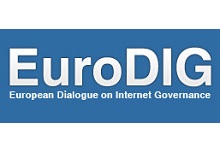NRI assembly
18 Jun 2019 14:30h - 18:00h
Event report
[Read more session reports and live updates from the EuroDig 2019]
The assembly represented an opportunity to share ideas and best practices from European National and Regional Internet Governance Initiatives (NRIs). The session was divided in three parts. The first part featured a meeting with Missions Publiques, a consultancy which works on improving governance by including ordinary citizens in the process of policy-making. The second part was dedicated to a EuroDIG intersessional project, while the third part consisted of a brief discussion on EuroDIG’s plans for a new website.
During the first part of the session, a Missions Publiques representative presented their survey which dealt with questions about the Internet and Internet governance, in order to see which topics citizens put on the agenda in contrast to experts. The survey was carried out in 12 countries on 4 continents and included 20-30 citizens. Regarding the perception of the Internet by ordinary people, 80% of the persons polled saw it as an opportunity. The issue of fake news inspired a great debate, but survey participants stated they are aware that they need to check sources. The question of access was a more important topic for survey participants from the global North. Security and cybersecurity were topics citizens were unsure how to deal with. Dependence and addiction were bigger concerns, and these issues are not represented in policy discussions. Another topic participants were polled on was whether citizens want to have a licence for going online; citizens saw two levels of usage of a license, and they would appreciate instructions at the level of usage that requires more complex processes to be carried out.
Session participants then discussed topics for which ordinary citizens can unlock political discussions on Internet governance. They stated that cybersecurity, fake news, access blocking, among others, are important for ordinary citizens. It was also stated that citizens should look at their rights and freedoms and see how they are preserved or infringed on the Internet and via the use of digital technologies.
Representatives of Mission Politiques then briefly spoke about next steps, which involves having a conversation about the citizens’ dialogue on Internet governance during Day 0 at the Internet Governance Forum (IGF) 2019 in Berlin, Germany.
The second part of the session focused on an initiative launched by EuroDIG to collect comments from European stakeholders on the recently released report of the UN Secretary-General’s High-level Panel on Digital Cooperation. A commenting platform has been set up on the EuroDIG website, allowing European actors to comment on specific paragraphs of the report. In addition to that, more general statements, comments, and remarks can also be submitted via e-mail to the EuroDIG Secretariat. After the 15 September deadline, a document will be produced to summarise the input, and the aim is for this document to feed into the discussions that are expected to be held during the IGF 2019 meeting. The EuroDIG Secretariat explained that the aim of this initiative is to reflect the diversity of views and contributions across Europe on the recommendations of the report. NRIs were invited to encourage their communities to contribute to this exercise and share their views on the report.
The third part of the session included a brief discussion on how the synergies between the European NRIs could be improved. In this context, EuroDIG announced it was developing a new website, to improve its functionalities and be compliant with the EU General Data Protection Regulation (GDPR). NRIs were invited to share their views on how they could be displayed on the new website. During the discussions, EuroDIG was asked to share its experience regarding the development of a GDPR-compliant website, as NRIs would benefit from such insights.
By Andrijana Gavrilović and Stefania Pia Grottola
Related topics
Related event

